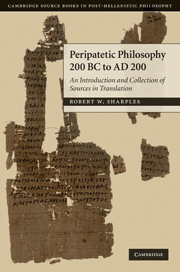Book contents
- Frontmatter
- Contents
- Preface
- Abbreviations
- Introduction
- Individuals
- Logic and ontology
- Chapter 7 The Categories
- Chapter 8 The Categories
- Chapter 9 The Categories
- Chapter 10 The Categories
- Chapter 11 On Interpretation
- Chapter 12 Ontology
- Chapter 13 Logic
- Chapter 14 Theory of knowledge
- Ethics
- Physics
- Bibliography
- Index of sources
- Index of passages cited
- Index of personal names (ancient)
- General index
Chapter 9 - The Categories
(iii) Ten categories or two?
Published online by Cambridge University Press: 05 June 2012
- Frontmatter
- Contents
- Preface
- Abbreviations
- Introduction
- Individuals
- Logic and ontology
- Chapter 7 The Categories
- Chapter 8 The Categories
- Chapter 9 The Categories
- Chapter 10 The Categories
- Chapter 11 On Interpretation
- Chapter 12 Ontology
- Chapter 13 Logic
- Chapter 14 Theory of knowledge
- Ethics
- Physics
- Bibliography
- Index of sources
- Index of passages cited
- Index of personal names (ancient)
- General index
Summary
Simplicius, On Aristotle’s Categories 63.22–6
The followers of Xenocrates and Andronicus seem to include everything in what is per se and what is relative, so that according to them so great a multitude of categories is superfluous. Others divide into substance and accident; and these in a way seem to say the same as the previous people who say that accidents are relative, since they are always of other things, and that substance is per se.
Simplicius, On Aristotle’s Categories 157.18–22
Nor must one follow Andronicus who puts those items which are in relation to something after all the other categories, on the grounds that [relation] is a skhesis and a side-growth [paraphuas]. For the skhesis of the items which are in relation to something, connatural as it is, takes the lead compared with the acquired skheseis, which is also Archytas’ view. (Reinhardt 2007, 521)
- Type
- Chapter
- Information
- Peripatetic Philosophy, 200 BC to AD 200An Introduction and Collection of Sources in Translation, pp. 58 - 63Publisher: Cambridge University PressPrint publication year: 2010

